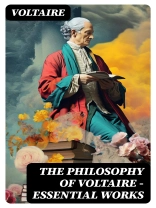In ‘The Philosophy of Voltaire – Essential Works, ‘ the reader is invited into the vibrant intellectual tapestry of the Enlightenment through Voltaire’s critical essays, witty narratives, and incisive plays. This compilation showcases Voltaire’s adept use of satire and irony, delving into themes of religious tolerance, freedom of expression, and the critique of dogma. His literary style reflects the clarity and precision prized during his time, while also engaging with the tumultuous socio-political landscape of 18th-century France, marked by fervent debates over reason, faith, and human rights. Voltaire, the pen name of François-Marie Arouet, was not merely an author but a fervent advocate for civil liberties. His experiences with censorship, imprisonment, and the injustices of his era informed his relentless pursuit of truth and reason. Voltaire’s wit and philosophical acumen flourished as he navigated the complexities of a society shackled by superstition, shaping his visionary ideas about enlightenment and the possibilities of reform. This essential collection is a must-read for anyone seeking to grasp the foundations of Enlightenment thought and its relevance today. Readers will find in Voltaire’s work not just philosophical musings but a call to action, encouraging them to question authority and embrace reason as a guiding principle in their own lives.
Circa l’autore
François-Marie Arouet, known by his nom de plume Voltaire, was a towering figure in the Enlightenment era, renowned for his wit, satire, and critical capacity. Born on November 21, 1694, in Paris, Voltaire quickly rose to literary prominence with a prolific output that included plays, poetry, novels, essays, historical and scientific works, over 21, 000 letters, and an estimated 2, 000 books and pamphlets. A fierce advocate for civil liberties, he was an outspoken critic of religious dogma and intolerance, and his works frequently echoed the values of reason, freedom of speech, and separation of church and state. The compilation ‘The Philosophy of Voltaire – Essential Works’ represents an essential distillation of his thought, coursing through his various disciplines yet unified in its quest for intellectual freedom and social reform. Voltaire’s style is characterized by its use of irony and wit to dissect and challenge the status quo, earning him both great admiration and controversy. His impact on literature and subsequent intellectual movements, like his role in defining the spirit of skepticism and reform of the Enlightenment, is indelible. His legacy endures not just in the breadth of his work but also in the critical ethos that continues to influence modern thought.












